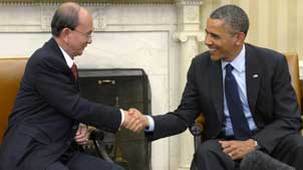 President Thein Sein of Burma is visiting Barack Obama in Washington this week. He is the first Burmese head of state to visit the USA in over 47 years, yet his visit has roused protests outside the White House and beyond. Human Rights campaigners feel that, considering the negative state of human rights throughout Burma, the visit is too premature. In some ways this trip reflects the evolution of some positive changes in Burma, but although there are fragile ceasefires, the release of many political prisoners and a representation of the National League for Democracy in the parliament, there is a very long way to go if Burma is to establish real reform. The Irrawaddy states that, ahead of this White House visit, many ethnic leaders in Burma have expressed anger about how the United States are not doing enough to support a proper peace process. The Guardian has described the disappointment that many groups have felt at President Obama’s use of the title ‘Myanmar’, instead of Burma, in his statements during the visit. This is a name that has been previously avoided as it is used by the military junta and not inclusive of all the country's ethnic groupings. Many repressive laws in Burma remain unchallenged and serious human rights abuses continue unabated throughout the country. Military offenses against the people of Kachin State have displaced 100,000 civilians and burned down over 200 villages. Children on the Edge have provided essential aid for these displaced children living in temporary camps and are fundraising to provide crucial early childhood development support for children in 12 camps. The Rohingya who have lived in Arakan State, Burma for generations are still labelled by the government as ‘illegal Bengali immigrants’. They are persecuted and abused by the authorities and the communities around them, and have become the most marginalised group in the world. In the same week that Thein Sein left to visit President Obama, authorities in Arakan State created a two child only policy for the Rohingya people. We have been working with this people group for the last three years in Bangladesh, where thousands of Rohingya have fled and are living in makeshift camps. Here, they are not recognised as refugees and have no chance of help for their children. We are currently providing education to 1,800 children in makeshift refugee camps and are looking to expand to meet the increasing need. This article in the New York Times, co-authored by Benedict Rogers of CSW, provides an excellent overview of the situation in Burma and the international response. Read more about our projects with the Kachin and Rohingya people of Burma, and please consider donating. Support usComments are closed.
|
RECEIVE OUR EMAILSBlog Categories
All
Archives
July 2024
|
|
JOIN US ON SOCIAL MEDIA
|
Annual Report | Contact Us | Jobs | Media Centre | Resources | Shop
Accessibility & Policies: Accessibility | Equity, Diversity & Inclusion Policy | Complaints| Privacy Policy | Safeguarding
Accessibility & Policies: Accessibility | Equity, Diversity & Inclusion Policy | Complaints| Privacy Policy | Safeguarding
Children on the Edge, 5 The Victoria, 25 St Pancras, Chichester, West Sussex, PO19 7LT, UK | 01243 538530 | [email protected]


 Give monthly
Give monthly Fundraise for us
Fundraise for us RSS Feed
RSS Feed
